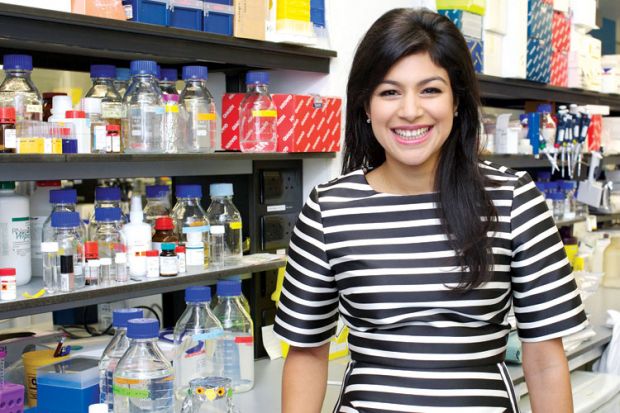Source: Cosmopolitan
Neha Pathak (@nxpathak) is an academic clinical fellow at Queen Mary University of London. Last month she was awarded the “Ultimate Game Changer” prize at the Cosmopolitan Ultimate Women Awards for her research to develop a simple urine test that could offer less invasive screening for cervical cancer than the smear test.
Where were you born?
Barking, East London.
How has this shaped you?
I grew up surrounded by a wealth of diversity with respect to ethnicity, socio-economic status and cultural values. It drives the way I interact with patients on a daily basis and the types of research questions I am interested in.
Did you even consider being nominated for, let alone winning, the Cosmopolitan award?
All I wanted this year was to learn a new research method and make a small but meaningful contribution to women’s health and cancer research. Everything else has been an utter surprise.
What is the significance of winning such an award?
It gives me a boost to persevere through the more tiring days, but more importantly it brings women in science into the mainstream. I hope it encourages some young teenage girls somewhere to persist with their scientific talents and pursuits.
Your research is an important breakthrough, but it is only the beginning. What are the next steps?
It’s a small piece of an enormous jigsaw and there’s a long road ahead. The urine test needs to be refined to ensure that cases of cancer are not missed, it needs to be compared with other self-testing techniques, and the cost effectiveness needs to be evaluated. The last is especially important to determine the true value of this test in the developing world.
Do you hope that recognition from Cosmopolitan might inspire the magazine’s younger readers to pursue a career in science?
I certainly hope that this inspires others, but I do not believe that inspiration is enough. There needs to be systematic institutional change that seeks to address the reasons why highly intelligent girls and women leave academia and do not study subjects such as physics and engineering. I am very proud to be a supporter of Stemettes, an excellent organisation that is driving such change.
As a child, what did you want to do when you grew up?
My favourite piece of writing by my six-year-old self reads: “I want to be an explorer so I can discover mountains and see how snow and grass is made.” I suppose being a scientist isn’t too far off.
What advice would you give to your younger self?
It’s OK to not be the best and focus on your personal goals rather than standards set by others. Going at your own pace and enjoying the ride is key to staying happy in what you do.
What are the best and worst things about your job?
The best: the number of amazing people I meet, whether they are patients, scientists, doctors or other NHS staff. Everyone has a good story to share. The worst: there’s never enough time to do everything that you want to do.
What do you do for fun?
My favourite days are spent running (I am training for my first marathon), taking photos (my blog is www.nxpathak.tumblr.com) and gorging on food with family and friends.
What kind of undergraduate were you?
Not especially academic to be honest, although I was always busy and thought that I could conquer sleep. I fancied myself to be a bit arty and I think most people would have described me as somewhat quirky.
If you were the universities minister for a day, what policy would you immediately introduce to the sector?
More outreach events for women in science where smart girls at school can be introduced to university students and early career researchers to mentor them and act as role models.
Appointments
The University of Portsmouth has appointed Stephen Wiggins academic registrar. He is currently faculty registrar for engineering and physical sciences at the University of Surrey.
Janine Griffiths-Baker and Robert Mortimer have been appointed deans at Nottingham Trent University. Professor Griffiths-Baker will take on the role at Nottingham Law School while Professor Mortimer joins the School of Animal, Rural and Environmental Sciences.
Leeds Beckett University has made Phil Cardew its deputy vice-chancellor (academic). He joins from London South Bank University in April.
Fiona Beveridge has been appointed executive pro vice-chancellor of the Faculty of Humanities and Social Sciences at the University of Liverpool.
Tom Rye, formerly professor of transport at Lund University in Sweden, has taken up the role of director of the Transport Research Institute at Edinburgh Napier University.
Rob Eason, associate dean (research) for the Faculty of Physical Sciences and Engineering at the University of Southampton, has been elected to the main decision-making board for the European technology platform Photonics21.
Register to continue
Why register?
- Registration is free and only takes a moment
- Once registered, you can read 3 articles a month
- Sign up for our newsletter
Subscribe
Or subscribe for unlimited access to:
- Unlimited access to news, views, insights & reviews
- Digital editions
- Digital access to THE’s university and college rankings analysis
Already registered or a current subscriber? Login

